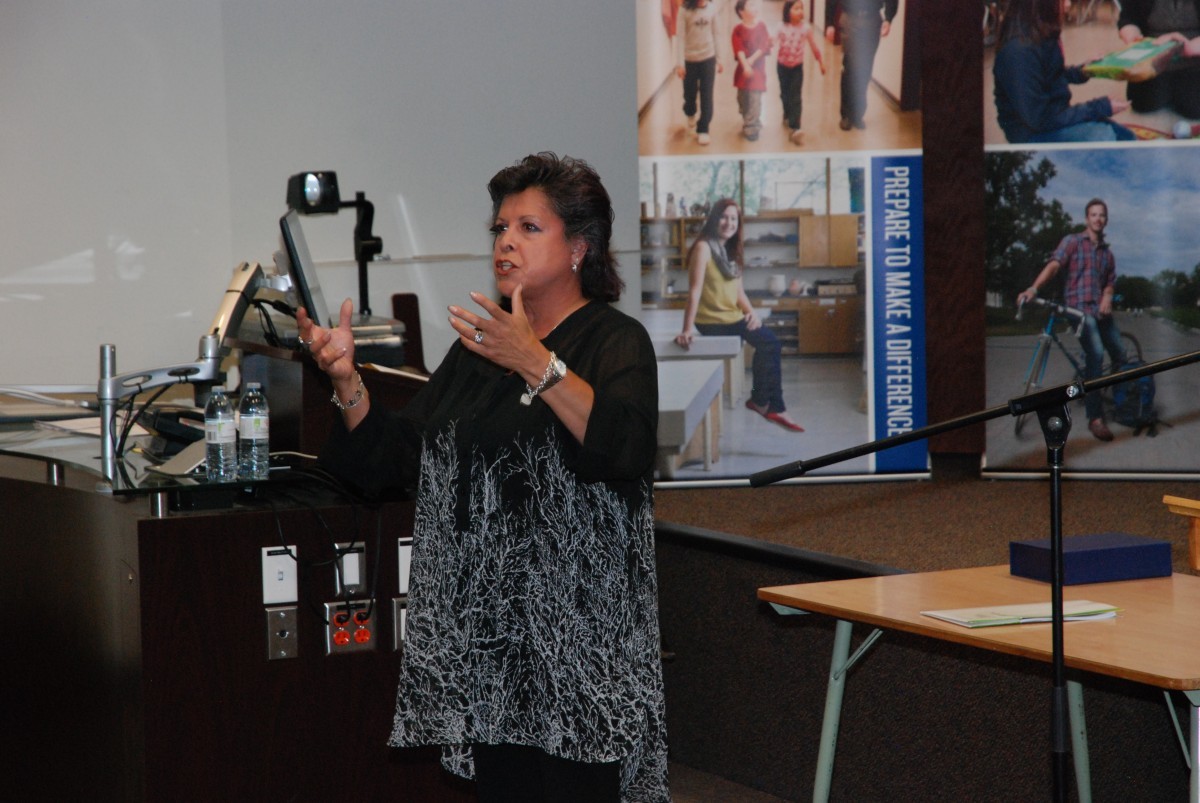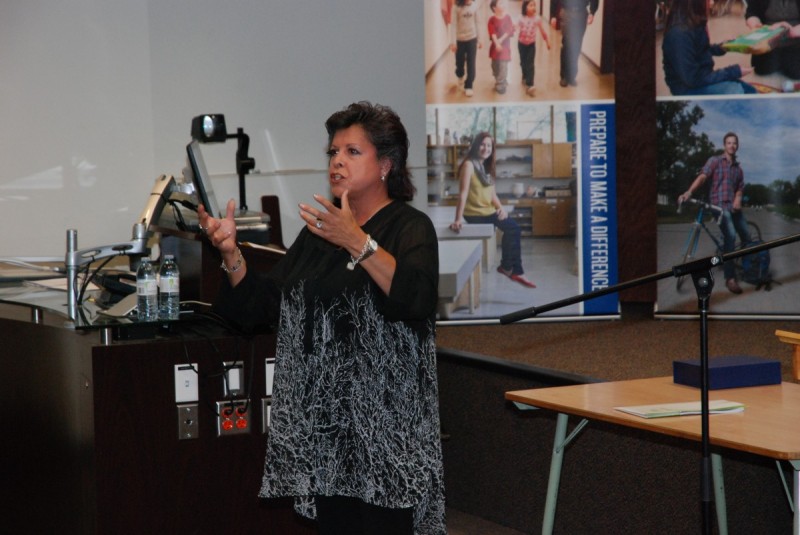
Support aboriginal youth in quest for education, audience told
But youth should be given same opportunities as non-Indigenous youth; should not be treated with 'kid gloves' says Homecoming speaker
Aboriginal youth need the proper supports to get ahead in education, but they should not be treated with “kid gloves,” Cynthia Wesley-Esquimaux told the audience at the 2015 Faculty of Education Homecoming evening event.
Wesley-Esquimaux, vice-provost (aboriginal initiatives) at Lakehead University in Thunder Bay, Ont., gave an inspirational keynote speech focused on Indigenous education at this year’s Faculty of Education Homecoming Evening, entitled, “Moving forward: Embedding Indigenous knowledge and Aboriginal history into the work we do.”
During her speech, she spoke at length about ensuring the next generation of Indigenous youth receives a solid education.
But she warned, “The idea of education—overhelping students–can be problematic. We have to raise the bar for aboriginal students so they are competing at a level where their skills, etc., actually are. Stop handling them with kid gloves and give them the opportunity to spread their wings just like every other kid.”
She also talked about the issue of “the violence of benevolence.”
Non-Indigenous Canadians must stop thinking that “they need to do all kinds of things to help aboriginal communities,” she noted. “When in fact, just getting out of the way is what’s going to make it possible.”
Great strides in education
The vice-provost of aboriginal initiatives told the Homecoming audience that some of the supports and encouragements that are currently in place for aboriginal people in terms of higher education will probably disappear in the next two decades, as aboriginals have been making great strides in higher education and will continue to do so.
In 1962, for example, there were only 12 students in post-secondary education in Canada, said Wesley-Esquimaux. Based on 2006 statistics, Canada had 1,100 aboriginal PhDs who graduated across Canada in all disciplines, more than 6,000 aboriginal masters graduates and 30,000 undergraduates, she told the audience.
“So, although you are given the news that aboriginal people are in a bad space and aren’t educated and they aren’t getting ahead—they are.”
“It’s a kind of a wave that is coming at you,” Wesley-Esquimaux added.
Wesley-Esquimaux, who is a member of the Chippewa of Georgina Island First Nation In Lake Simcoe, Ont., created her own unique path to higher education. Raised in Toronto, at 16 she dropped out of school and at 20 she moved to southern California, where she discovered that Aboriginal people were treated differently than they were in Canada. She began to embark on a journey of self-discovery and started her academic career. She completed high school and went on to the College of the Desert. She returned to Canada for even more schooling and ultimately got her PhD in social cultural anthropology from the University of Toronto.
As a child of two parents who were residential school survivors, her research and academic writing “is focused on understanding the continued transmission of historic and intergenerational trauma and unresolved grief, primarily within the aboriginal community.”
Youth exchange
One of her current initiatives is a youth exchange that she created with the help of several students while she was teaching at the U of T. The students told her they wanted to create a way to learn, firsthand, about Indigenous communities.
Wesley-Esquimaux and a team began taking busloads of youths from across the country into remote and northern First Nations communities.
The program is now in its eighth year.
“There has not been a community yet that has not welcomed these kids with open arms. They learn about indigenous community, foods, spiritual practices, languages, along with troubles the community has.”
Wesley-Esquimaux said the program has been an invaluable teaching tool for both Indigenous and non-Indigenous youth.
Moving forward with the TRC
She also spoke about the Truth and Reconciliation Commission and its findings.
“What we found about reconciliation is we needed to do more. We needed to give people a better understanding about who the Indigenous community is, why it is important to embed Indigenous knowledge into our curriculum, into high schools and into universities.”
She and other colleagues found that the best way to do that is through peer-to-peer engagement. Thus, Wesley-Esquimaux and others set up reconciliation teams across the country that are currently working with other young people.
Bringing young people together to talk about the TRC’s final report has been invaluable, she said. “They listen to me, but to a large extent they listen to each other more.”
Wesley-Esquimaux encouraged the audience, as educators, to help get out a positive word about aboriginal youth to the larger community.
“I think it’s important as an academic community to go out and tell this story to the wider community, how we can make it better.”
She said she thinks highly of the current generation of Indigenous youth, and they have a bright future.
Now, Wesley-Esquimaux said, it’s important to move forward. Indigenous people are economically competitive, involved in many industries, generating revenue and creating art in terms of literature and films. And, increasing numbers of young people are going to school, she noted.
“So that is creating a spiritual awakening. We are on a pathway with that change. It has been a tremendous journey. We are not done yet. We are still on that journey we will be on it for a while yet. We are asking that you help ensure that the intergenerational transmission of positive identity behaviours continues to happen. That is the task before us, as educators. That’s what I’m asking you to do as people who care.”







